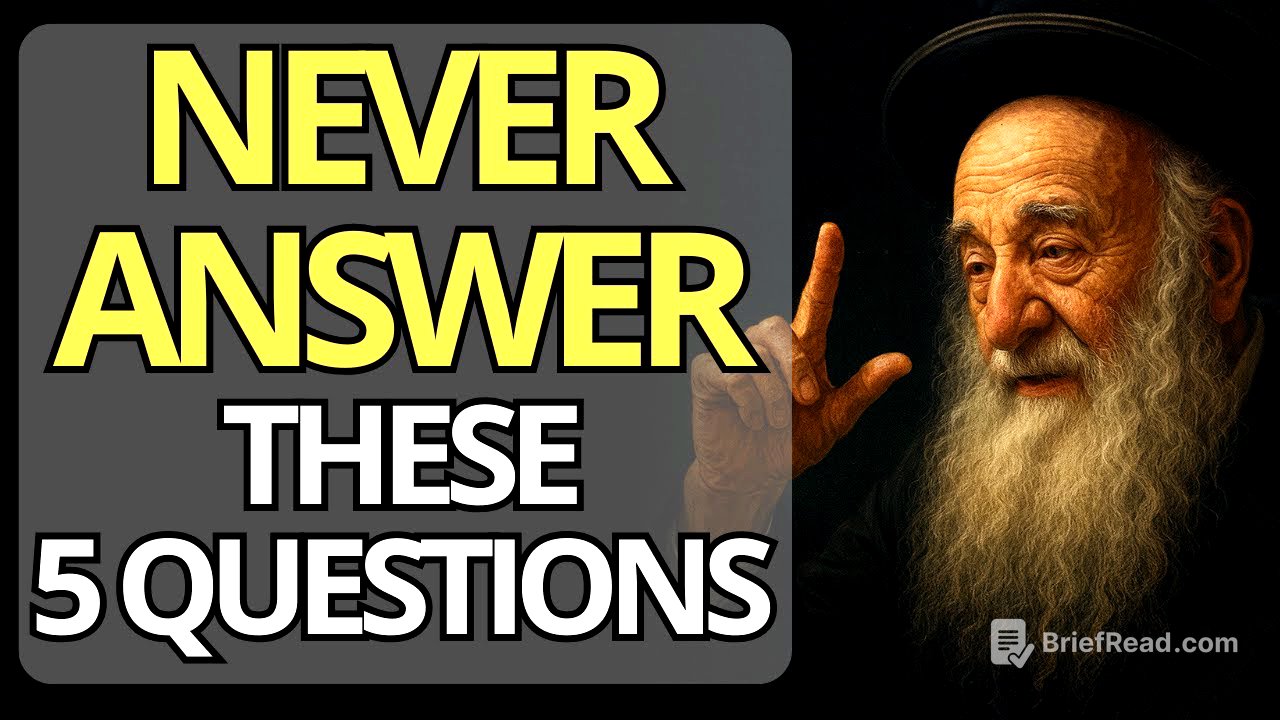TLDR;
This video explores five common questions used as psychological traps to manipulate and control others. It highlights the importance of recognising these questions and responding with careful consideration or silence to maintain emotional and mental well-being. The video draws on ancient wisdom and psychological principles to guide viewers in navigating manipulative conversations and protecting their boundaries.
- Identifying manipulative questions
- Importance of silence and thoughtful responses
- Protecting personal boundaries and emotional well-being
Intro [0:00]
The video introduces the concept that not all questions seek truth; some are designed to confuse and manipulate. It emphasises the wisdom of knowing which questions to avoid answering, highlighting that silence can be a powerful tool against manipulation. The modern world often pressures individuals to react and justify themselves, but true wisdom lies in discerning when not to respond, using silence as a form of strength and control. The video will explore five specific questions that are commonly used to manipulate, deceive, and control others, offering insights into how to recognise and respond to these subtle psychological traps.
1. The First Trap [1:26]
The first manipulative question discussed is, "Why are you so nervous?" This question, though seemingly harmless, is a tactic known as emotional induction, designed to make you accept a false reality. Responding to it means falling into the trap of assuming something is wrong with you, shifting you from a position of confidence to one of defence. The wise approach is to maintain calmness and respond simply with "I'm fine," or to redirect the question back to the asker to neutralise their power. Recognising this manipulation is crucial for emotional mastery and understanding how control is often disguised as concern.
2. The Illusion of Trust [2:47]
The second manipulative question is, "Don't you trust me?" This phrase is a form of guilt disguised as closeness, forcing you into a false dilemma where you must either trust blindly or be seen as disloyal. True trust, however, does not equate to blindness, and caution is a necessary balance. A wise response involves calmly asserting that trust and verification are not enemies or that the issue is about responsibility, not distrust. Genuine individuals who deserve trust will not demand it; they will understand it, distinguishing honest connection from emotional control.
3. The Shadow of Doubt [4:15]
The third manipulative question is, "What are you hiding from me?" This question targets your dignity by presuming guilt and deceit. Responding defensively or explaining further only reinforces the suspicion, making you feel exposed and powerless. Privacy is not the same as secrecy; it is a matter of self-respect, and everyone is entitled to their inner world. A composed response might involve asking why they think you are hiding something or asserting that everyone deserves privacy. Those who demand total transparency often have the most to conceal, and healthy relationships are built on respect, not surveillance.
4. The Test of Integrity [5:46]
The fourth manipulative question is, "Do you think you're better than everyone else?" This question aims to shame you for standing apart, refusing to conform, or having principles. It plays on the fear of rejection and attempts to make you apologise for having standards. Standing firm in your principles is not arrogance but self-respect. A calm and convicted response could be, "I don't think I'm better; I'm simply making the choice that's right for me," or "Everyone has their own journey; I respect yours, please respect mine." Refusing to be shamed for doing what is right strengthens your resolve and makes you impossible to control.
5. The Deceptive Truth [7:34]
The fifth and most subtle manipulative question is, "You won't be offended if I tell you the truth?" This question is a mask for cruelty, not an invitation to honest feedback. The speaker is seeking permission to be hurtful under the guise of honesty. A true friend speaks with empathy or remains silent, without needing to preface honesty with a disclaimer. The danger lies in accepting disrespect as honesty. A wise response involves disarming the game by saying, "That depends on what you're about to say," or suggesting they reconsider if it might be offensive. This returns responsibility to the speaker and exposes the truth behind their words, as true wisdom does not hide cruelty behind honesty.









